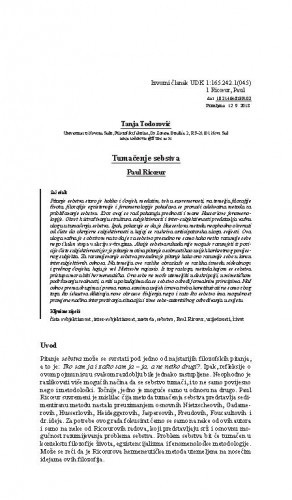Pitanje sebstva staro je koliko i čovjek, međutim, tek u suvremenosti, na temelju filozofije života, filozofije egzistencije i fenomenologije pokušava se pronaći adekvatna metoda za približavanje sebstvu. Kroz ovaj se rad pokazuju prednosti i mane Husserlove fenomenologije. Okret k istraživanju struktura subjektivnosti i inter-subjektivnosti predstavlja važnu ulogu u tumačenju sebstva. Ipak, pokazuje se da je Husserlovu metodu neophodno okrenuti od čiste do оkrnjene subjektivnosti u kojoj se raskriva anticipatorska uloga svijesti. Ova uloga važna je s obzirom na to da je za sebstvo presudno ne samo kako netko razumije sebe nego i kako stupa u akciju s-drugima. Akcije sebstva nikada nije moguće razumjeti iz pozicije čiste subjektivnosti jer je pitanje motiva pitanje osobnosti kao uvijek konkretnog povijesnog subjekta. Za razumijevanje sebstva presudno je pitanje kako ono razumije sebe u lancu intersubjektivnih odnosa. Na temelju ove razlike obrazlaže se razlika između »idealnog« i grešnog čovjeka, koju je već Nietzsche najavio. Iz tog razloga, metoda kojom se sebstvu pristupa mora biti hermeneutička. Ono sebe ne može utemeljiti u deskripciji, u mimetičkom podržavanju realnosti, a niti u pokušajima da se sebstvo odredi formalnim principima. Naš odnos prema drugima i prema nama samima uvijek iznova treba konstituirati ne samo zbog toga što iskustva diktiraju nove obrasce življenja nego i zato što sebstvo ima mogućnost promjene načina interpretiranja situacija i time sebe-autentičnog određivanja u svijetu.; The question of selfhood is a very old question; however, only in contemporary philosophy on the foundations of the philosophy of life, philosophy of existence and phenomenology, it is possible to find an adequate method that could enable us to approach the understanding of selfhood. To accomplish this task, the advantages and disadvantages of Husserl's phenomenology must be demonstrated. Here, the research of the structures of subjectivity and inter-subjectivity performs an important role in the interpretation of selfhood. Nevertheless, it has been shown that it is necessary to reverse Husserl’s method from pure subjectivity to fragmented subjectivity in which the anticipatory role of consciousness is being re-discovered. This is important for the interpretation of selfhood not just in a theoretical way, but also in showing that selfhood could be understood only in relation to others. Actions of the self can never be understood from the position of pure subjectivity because the question of motives is a question of personality that is always a concrete historical subject. The crucial point in understanding the selfhood is showing the way in which it understands itself in the chain of intersubjective relations. From this point, it is possible to distinguish “ideal” from sinful man, the difference which has been emphasized in Nietzsche's philosophy. The only method by which we can approach the question of selfhood is the hermeneutical method. It can’t be understood by description or in the attempts to deduce it on formalism and norms. Our relationship towards others and towards ourselves should be again and again re-constructed, not only because the experience itself dictates new patterns of life, but also because only the selfhood has the ability to change the way in which the situation is interpreted and thereby it can authentically determine itself in the world.
Sažetak

 Filozofska istraživanja : 39,1(2019) / glavni i odgovorni urednik Ante Čović.
Filozofska istraživanja : 39,1(2019) / glavni i odgovorni urednik Ante Čović.